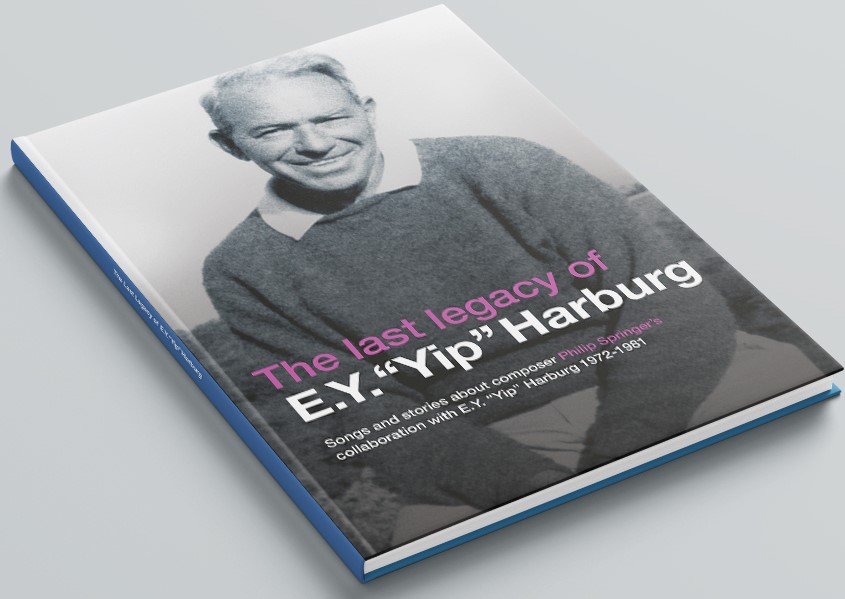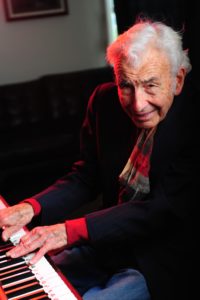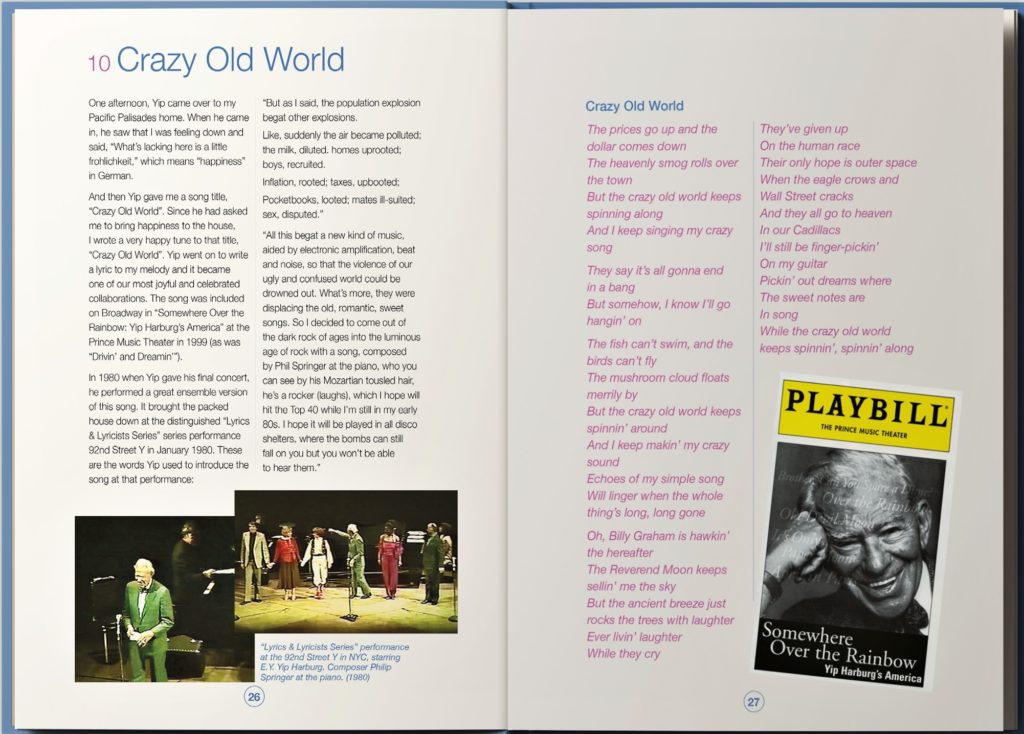The songs of composer Philip Springer and lyricist E.Y. Harburg have been submitted to the Recording Academy for Grammy consideration in the Best Album Notes and Best Historical Album consideration.
Tamar Springer, daughter of Philip, has shared the history of the two remarkable men, and the project, a book “The Last Legacy of E.Y. ‘Yip’ Harburg” that became her focus during the Covid-19 shutdown.
“The point of the project was to tell the unique story of the songwriting collaboration,” said Tamar, who is also the executive director of Tamir Music, which is the publishing company that controls the copyrights to her famous dad’s songs. (The name Tamir comes from Tamara and sister Miriam’s name.)
Not only is the collaboration fascinating, but the individuals were highly successful before finally working together, more than 20 years after they originally met.
Philip, a long-time Palisadian, was born in 1926 on Riverside Drive in New York City. His mother Sylvia was a concert pianist and his father Mordecai a lawyer. He went to grade and high school in Cedarhurst and graduated in 1944 from Lawrence High school. He immediately entered into the Army as a truck driver but served as Mickey Rooney’s musical director for the show “Don’t Touch that Dial.”
After his service, Springer studied composition at Columbia College and started writing songs: his first top ten was “Teasin” in 1950. The song was recorded by Connie Haines in the United States and The Beverly Sisters in the United Kingdom.
That same year, when he was 24, he met E.Y. “Yip” Harburg who was 54. He had been invited to Harburg’s apartment at 25 Central Park West through his father’s best friend. Springer in effort to impress the well-known man, played eight songs on the piano.
It worked, because Springer was then invited to every one of Harburg’s star-studded parties, where Phil played the piano and Yip sang with Phil’s accompaniment.
Although friends, each worked with other songwriters. Springer would have a major hit with “Santa Baby” in 1953 with Eartha Kitt.
He worked with top artists and lyrists including Frank Sinatra “How Little it Matters, How Little We Know,” (Carolyn Leigh); Judy Garland “Heartbroken” (Fred Ebb); Cliff Richard “The Next Time” (Buddy Kaye); Dusty Springfield “All Cried Out” (Buddy Kaye); Elvis Presley “Never Ending” Buddy Kaye; Aretha Franklin “Her Little Heart Went to Loveland” (Buddy Kaye) and Eartha Kitt “Oh John” (Fred Ebb).
Harburg, born in 1896, was the son of Yiddish-speaking Orthodox Jews who had emigrated from Russia. He attended high school with Ira Gershwin and they became lifelong friends.
After World War I, Harburg initially became co-owner of an appliance company, but it went bankrupt in 1929, leaving him with enormous debt. It was then that Gershwin convinced him to start writing song lyrics.
His song “Brother, Can You Spare a Dime?” becoming an anthem of the Great Depression.
He achieved fame with “April in Paris“, and “It’s Only a Paper Moon“, as well as all of the songs for the film “The Wizard of Oz.”
In 1940, he won an Oscar, shared with Harold Arlen, for Best Music, Original Song for “The Wizard of Oz” (1939). In addition, he was nominated for an Oscar for Best Music, Original Song, along with Arlen, for “Cabin in the Sky,” (1943) and Best Music, Original Song for “Can’t Help Singing,” with Jerome Kern (1944).
Harburg and Springer became collaborators in the last years of Harburg’s life, from 1972 to 1981. During this time period they wrote about 15 complete songs together.
Tamar remembers “Yip visited the Springer home often, on every trip he made to Los Angeles.
“He was a dear family friend and made up bedtime stories for me,” she said. “He a grandfather figure to me.” Harburg spent the last night of his life at the Springer family home in Pacific Palisades. He died in 1981, while driving on Sunset Boulevard in Los Angeles.
In 2004 the American Film Institute broadcast “AFI’s 100 Years. . ..100 Songs” lists “Over the Rainbow” as the number one song, and “Ding-Dong! The Witch is Dead” was number 82.
In 2005, the U.S. Postal Service, issued a commemorative stamp recognizing Harburg’s accomplishments.
Tamar told CTN that the historical category is for restored recordings. “We have four of Yip singing on the album,” she said. “Yip sings/recites 4 of the songs ‘Time, You Old Gypsy Man’ (Yip stated that this was his greatest song and the New York Times called it a ‘little masterpiece.’; ‘Hitchhikers,’ ‘Edelaine’ and ‘Crazy Old World’.”
Composer Springer sings “Wild Red Cherry River” and other songs include “Drivin’ and Dreamin’”, “It Might Have Been,” “Change of Sky” and “Many Different Colors.”
The book of album notes tells the story of these songs and Tamara is hopeful that the two men will be recognized by the Recording Academy Craft Committee. Nominations will be announced in mid-October.



